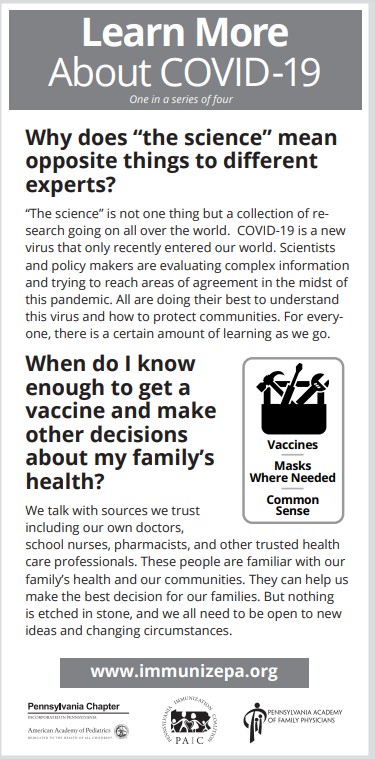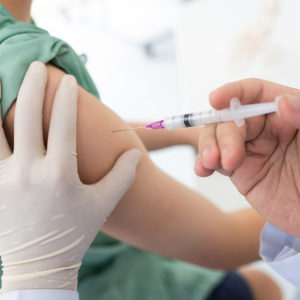In the hope of getting more people to roll up their sleeves and get vaccinated for COVID-19, the Pennsylvania Chapter of the American Academy of Pediatrics (PA AAP), in collaboration with the Pennsylvania Academy of Family Physicians (PAFP) and the Pennsylvania Immunization Coalition(PAIC), has launched an ad campaign aimed at rural Pennsylvanians.
The ads are running in weekly newspapers in rural counties from mid-September to mid-October.
Dr. Bonnie Offit, a pediatrician affiliated with Children’s Hospital of Philadelphia (CHOP) is involved in the effort to reach out to rural Pennsylvanians about the importance of those who are eligible getting vaccinated. She noted other populations, including some urban, inner-city residents, have also been reluctant to get vaccinated.
 Offit, who helped develop the ads, said they tried to be respectful of people living in rural areas.
Offit, who helped develop the ads, said they tried to be respectful of people living in rural areas.
“They just need to get that information,” she said. “Many of us watch the news and read the news and see these things, but not everybody sees the same stories or reads the same thing. So it’s a place where we can try to disseminate some more facts and information in the gentlest way that we could come up with.”
“It’s complex,” she said. “I think probably there are many sociological reasons, to be perfectly honest. I’m sure many people have taken a stab at trying to explain why.”
At first, the rollout was slow, she said. And in some rural areas getting the shot can involve driving to the nearest site where vaccines are available. But then there were outreach efforts and vans going out to areas, she said.
“We hear it over and over, that the best way to end this pandemic is to vaccinate,” she said. “The best weapon in our arsenal is vaccination. There’s nothing better than prevention. You can try treating it but like any virus in our history, vaccination is best.”
Because COVID-19 is a new virus, health professionals continue learning new things about treatments, she said.
“I think initially people thought if we could vaccinate 80 percent or even 60 percent we would start getting this really good herd immunity and the virus would be stopped in its tracks,” she said. “Unfortunately, that just hasn’t played out.”
“This is definitely one of those viruses that you can be asymptomatic, you can get it mildly, and it spreads very easily, especially this delta variant,” said Offit. “And so it became apparent we needed to vaccinate a larger number of people.”
Although people who contract COVID-19 have natural immunity, “you want to prevent serious cases. It’s just not worth the risk. It’s like playing a little bit of Russian roulette to take the risk to get the virus,” she said. “You might get mildly sick or you might die.”
As of Sept. 22, more than 12.6 million vaccination were administered in Pennsylvania and 67.9 percent of Pennsylvanians age 18 and older are fully vaccinated, according to the state Department of Health.
“The Department of Health is proactively reaching out to areas with low vaccination rates to educate people about the safety and effectiveness of the vaccines,” said Mark O’Neill, press secretary. “DOH continues to engage with rural and minority populations to make it easy for everyone to gain access to vaccination and to address hesitancy issues. Further, the department has taken a hard look at vaccine hesitancy in rural areas of the commonwealth. Working with our partners, we identify counties with the lowest vaccination rates and host events, and provide information targeted to address hesitancy concerns in these areas. For example, the department has partnered with county fairs in hosting vaccine clinics in these high priority areas and matched community organizations with local providers to host mobile clinics in these areas.”
O’Neill added, “The PA Unites Against COVID campaign is a statewide public health campaign sharing COVID-19 vaccine facts and information about how to find a vaccine provider. The current paid advertising appears across the state, but is heavily focused on reaching demographics and communities with low vaccination rates.”
These areas include rural communities as well as more urban Black and Latino neighborhoods. The advertising messages address “the unique concerns of each target demographic.” Some ads in heavily Hispanic areas are in Spanish as well.
“The paid advertising is just one part of the outreach efforts to encourage higher vaccination rates among Pennsylvania residents,” he said. “We are also partnering with community organizations, churches, salons and barbershops, state parks, county fairs, and many others, to hold vaccine clinics and educational events. These efforts are bringing vaccines straight to our residents – meeting them where they are while removing barriers to access. With a united outreach, the PA Unites Against COVID campaign aims to address vaccine concerns, help commonwealth residents get the information they need, and ultimately to receive vaccines to protect themselves, their families, and their communities.”

